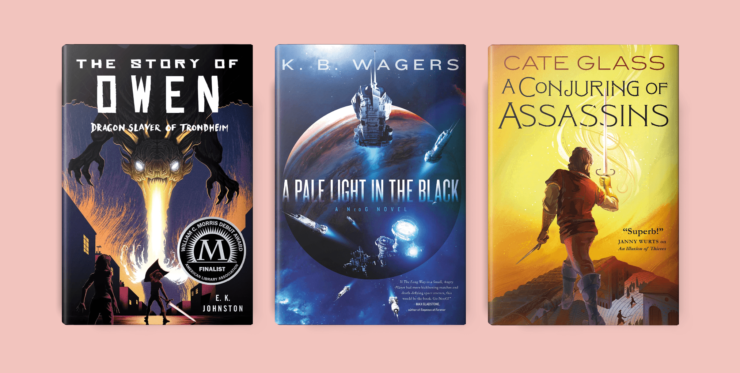I’m writing this post before the middle of March, and I hope that by the time it sees publication the news of the day will contain rather less about quarantine and states of emergency than it does at the time of writing. (I wish I were an optimist by nature.) But if the news continues as I expect it to, we’ll all need a soothing distraction.
E.K. Johnston’s The Story of Owen was her first novel. I haven’t read all of Johnston’s work—yet—but what I have read, I’ve loved. The Afterward is the best (or at least the most calculated to hit all my narrative kinks), but The Story of Owen comes a close second. It has a very Canadian sensibility, that small-town-in-a-big-continent sense of the quasi-rural, quasi-industrial that ostensibly should be similar to the American version and yet is strikingly different—and much more community focused. This is a world exactly like our own, save that there are dragons—dangerous, toxic beasts attracted to burning carbon, and they’ll destroy or eat everything around it—and dragon slayers, who generally come from families and have been trained up since childhood. The “just-one-change” approach mightn’t make sense on a world-historical scale, but for the story that Johnston’s telling, it really works. There’s a deep and powerful friendship between Siobhan McQuaid, the narrator, and the titular Owen (dragon slayer of Trondheim). And I especially enjoyed the married queer women mentors that The Story of Owen provided.
Johnston’s novels are deeply kind: they’re compassionate to their characters, and the world, and The Story of Owen is no different. It lifted my whole afternoon, and I needed the lift. I recommend it wholeheartedly.
Most of us have, I hope, heard of K.B. Wagers. Their Indranan War space opera trilogy (Behind the Throne, After the Crown, Beyond the Empire) is among the best space opera I’ve read in the last decade—and the follow-up Farian War trilogy is (so far) just as good. But Wagers has branched out this year, to a new space opera universe: one with a smaller scale and closer to home. A Pale Light in the Black follows the adventures of a crew in the Near-Earth Orbital Guard (the Coast Guard, but for space) as they prepare for the annual inter-service Boarding Games. And shake down with a new crewmember, Maxine Carmichael—who’s trying to make a life for herself away from the pressure and influential of her incredibly rich and important family. But along the way, Max and the crew of Zuma’s Ghost stumble across a dangerous conspiracy, one that could result in thousands of deaths. Max, her captain, and her team are the front line of defence—and they’re still determined to be competitive in the Games.
A Pale Light in the Black is a novel with a true ensemble cast, and a diverse one. Half the delight of reading it—and it is an absolute delight—is watching Wagers build up a solid team of complex people and give them character development through their interactions with each other. The other half is Wagers’ deft hand with pacing, action, and the slow build of tension and revelation. If space opera is your thing, I can’t recommend this book highly enough.
A Conjuring of Assassins is the sequel to An Illusion of Thieves by Cate Glass (who may be better known as Carol Berg). The worldbuilding is strongly influenced by the city-states of the Italian Renaissance, with the main character’s home, Cantagna, sharing characteristics with Florence and Milan.
A Conjuring of Assassins is another caper story, with plenty of intrigue and daring. Romy and her partners in crime and spycraft (magic-users, who’ll be sentenced to death along with their whole families if they’re caught and their patron, Cantagna’s Shadow Lord, can’t protect them) are tasked with infiltrating the home of the ambassador from Mercediare in order to prevent him from obtaining the kind of dangerous information that would lead to war. But there are secrets within secrets at play, and it will take all Romy’s skill and cunning—and that of the swordmaster Placidio, the smith Dumond, and Romy’s ne’er-do-well adolescent brother Neri— to succeed and get out alive. And Romy’s life is complicated by a young man from very far away whose life she saves, but who poses mysteries and problems of his own. Teo is more than he seems, but the question is—how much more?
A Conjuring of Assassins is a tense and enjoyable read. I recommend it, and I’m looking forward to the next book in the same world.
What are you guys reading lately?
Liz Bourke is a cranky queer person who reads books. She holds a Ph.D in Classics from Trinity College, Dublin. Her first book, Sleeping With Monsters, a collection of reviews and criticism, was published in 2017 by Aqueduct Press. It was a finalist for the 2018 Locus Awards and was nominated for a 2018 Hugo Award in Best Related Work. Find her at her blog, or find her at her Twitter. She supports the work of the Irish Refugee Council, the Transgender Equality Network Ireland, and the Abortion Rights Campaign.










